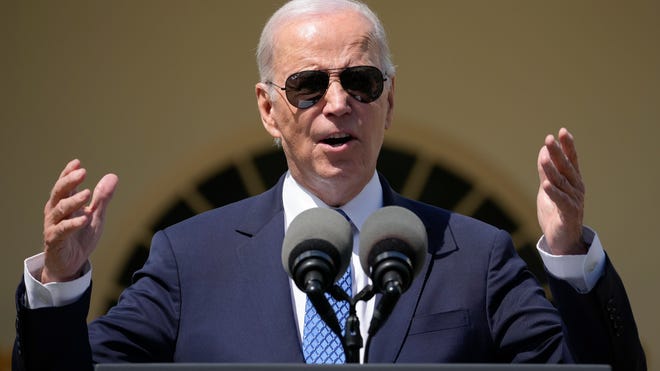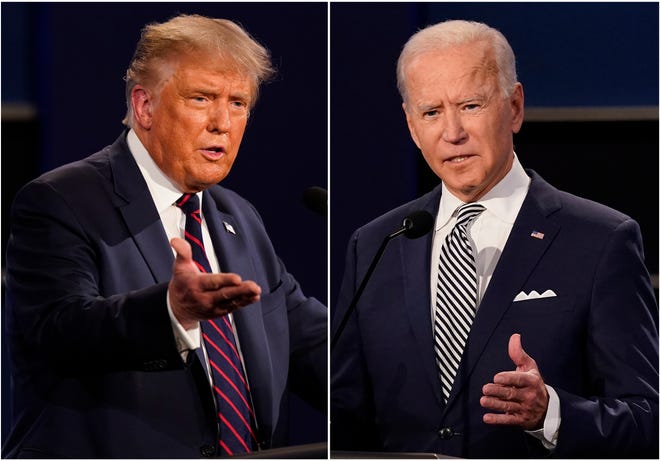
WASHINGTON – A rematch between Joe Biden and Donald Trump?
No thanks, most voters have said poll after poll poll.
But what if there was an alternative?
At the end of the day, elections are about elections.
The bipartisan group No Labels, a nonprofit that promotes centrist policies and politics, has launched a campaign to get a third-party candidate on the ballot in all 50 states in next year’s presidential election. The group has already secured a spot on the ballot in Arizona, Colorado, Alaska and Oregon.
The move, which has yet to settle on a candidate, is funded by $70 million from donors whose names the group refuses to disclose. The possibility of an independent candidate is causing consternation among Democrats and even some Republicans, who fear a third-party ticket could divert votes from Biden and send Trump to the White House for four more years.
“In our view, there is no greater threat to America than the potential re-election of Trump,” said Matt Bennett, founder of Third Way, a Washington-based think tank that advocates for center-left policies.
A third-party challenger can’t win the presidency — that hasn’t happened in the country’s 247-year history and won’t happen in 2024, Bennett said. But a third-party candidate could act as a spoiler and increase Trump’s odds of winning again, he said.

“Firsts matter”:Why Donald Trump’s arrest in New York is such a political earthquake
A voice for centrists or a spoiler for Trump?
No Labels counters that it has been unfairly defamed and that its motivations have been unreasonably questioned.
The goal, the group’s leaders insist, is simply to give another choice to moderate voters who are turned off by extremists in politics and unhappy with the options offered to them by the main political parties.
“The center needs a voice in this country,” said Nancy Jacobson, a Democratic operative who co-founded the group and is its executive director.
No Labels has no interest in serving as Trump’s spoiler, believes those concerns are unfounded, and would even withdraw its ticket if it felt the former president was in danger of running again, the group says.
“Donald Trump should not be president of the United States again,” two of the group’s advisers, former Connecticut Sen. Joe Lieberman, a Democrat turned independent, and Benjamin Chavis, former executive director of the NAACP, wrote in a recent op-ed. .
At the same time, “a growing majority of common sense” is exhausted “by the politics of grievance and victimhood,” they wrote. “They seek unity and cooperation. And they believe that our country can do much better than the choices in the election that we seem to be headed for in 2024.”
No Labels insists it is not even sure it will offer a presidential ticket next year. The goal is to field a “unity ticket” of one Democrat and one Republican, but the final decision won’t be made until next March’s Super Tuesday primary and a convention of the group’s supporters in Dallas next April.
Also, the group would seek a third-party ticket only if voters remain dissatisfied with the Democratic and Republican candidates, said Ryan Clancy, chief strategist for No Labels.
“The end game here is not to run an independent ticket,” Clancy said. “The end game is to make sure Americans have a choice of strong, effective and honest leaders who actually feel good about voting and who they believe will govern with common sense.”
Whatever the reason, No Labels’ pursuit of a third-party option has caused conflict even within the organization. William Galston, another of the group’s founders, resigned in April after questioning the wisdom of its third-party launch campaign.
“My judgment is that an independent third-party candidacy would make Donald Trump’s return to the White House more likely, not less likely,” Galston said. “I decided I had to act on that belief.”
Biden vs. Trump:Big, but opposing challenges as 2024 restart begins: survey
What is No Labels?
Washington-based No Labels was founded in 2010, the year after the arrival of the Tea Party movement, with the goal of promoting bipartisanship and countering the influence that extremists on both the left and right exercise in the nation’s political system. One of the organization’s most notable achievements was its role in founding the Problem Solvers Caucus, a group of centrist Democrats and Republicans in the House who work to foster bipartisan policy cooperation.
Running a third-party candidate for president will be a much bigger challenge and, if history is any indication, likely a quixotic exercise. No third-party candidate has ever come close to winning the presidency, but No Labels senses that dissatisfaction with Biden and Trump could provide a viable path to victory in 2024.
“What we think is changing,” Clancy said, “is that this large majority of people who maybe five years ago weren’t as engaged, they’re starting to recognize that if they don’t start showing up, if they don’t ‘Don’t get on the ground of play, then they leave it to the loudest, angriest voices, and things just keep getting worse.”
The group’s own poll shows that as many as 59% of Americans would consider a moderate, independent candidate for president next year. The same poll suggests that ticket would draw voters evenly from Democratic and Republican candidates, contradicting the conventional wisdom that Biden would be more successful than Trump.
With that in mind, No Labels has begun laying the groundwork to ensure ballot access for a third-party ticket in every state.
In 34 states, a group that collects enough signatures can take a spot on the ballot for a candidate to be named later. In the rest of the states, the candidates themselves must secure a place on the ballot.
No Labels’ plan is to gain ballot access for a single ticket in the first quarter of 2024 in every state where that’s possible, Clancy said.
How old is too old?President Biden Addresses Age Issues, Says Voters Can ‘Judge Whether I’ve Got It Or Not’
How have third-party candidates fared in other elections?
No Labels refuses to reveal who is putting up the $70 million to secure places on state ballots, saying only that its donors come from across the country and across the political spectrum. The group is keeping the names of donors private, it says, to protect them from the intimidation, harassment and threats of violence it has faced since announcing its presidential bid.
As a non-profit organization and not registered as a political organization, No Labels is not required by federal law to publish its list of donors.
While working to secure a third-party option, No Labels says it has no interest in running a presidential campaign. Once a ticket is selected, that responsibility falls to the candidate and their team, Clancy said.
Critics like Bennett remain convinced that a third-party ticket would be nothing more than a spoiler. It’s happened before.
The last time a former president tried to regain office was in 1912, when Republican Teddy Roosevelt ran for the Bull Moose Party just four years after leaving the White House.
Roosevelt was one of the most popular presidents in history, his face would be engraved on Mount Rushmore a few years later, but he didn’t come close to winning again. Roosevelt won 88 electoral votes and more than 27% of the popular vote, well below what he needed to win the presidency. But his candidacy split the GOP vote and helped send the Democratic nominee, Woodrow Wilson, to the White House.
Opinion:Do we really want Biden vs. Trump again? Americans need a third choice for president.
Other third-party candidates, notably Ross Perot in 1992 and Ralph Nader in 2000, attracted considerable attention but failed to secure a single electoral vote.
Perot was accused at the time of costing Republican George HW Bush a second term, although more recent analysis has suggested that he took votes away from both Bush and Democrat Bill Clinton, the winner. Nader, who ran as the Green Party candidate in 2000, won more than 97,000 votes in Florida, a state that Democrat Al Gore lost by 537 votes, costing him the presidency in an upcoming election . The two-party system is so ingrained in American politics. that party affiliations are an important part of Americans’ political identities and largely drive voting patterns, Galston said. Voters may tell pollsters they’re open to a third-party ticket, but when they get to the voting booth, they often stick with one of the party’s leading candidates because they don’t want to throw away their vote.
But if next year’s election is as close as polls suggest it could be, even a small percentage of voters choosing a third-party candidate over Biden in a few key states could swing the race toward Trump, Bennett said.
“It really doesn’t cost much,” he said.
Michael Collins covers the White House. Follow him on Twitter @mcollinsNEWS.
Exclusive:Robert F. Kennedy Jr. launches an unlikely presidential bid with the support of 14% of Biden voters
[ad_2]
Source link





